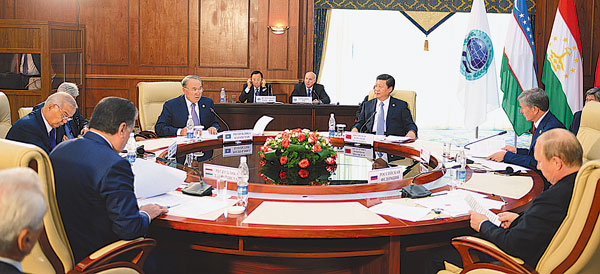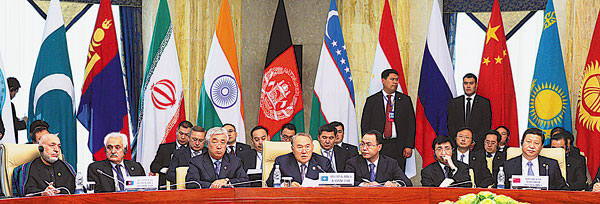BISHKEK – Ensuring security in Central Asia in light of rapidly changing geopolitical realities was among the key issues discussed at the regular meeting of the Shanghai Cooperation Organization Council of Heads of State held recently in Bishkek.

The recent summit of the Shanghai Cooperation Organization in Bishkek, Kyrgyzstan, focused heavily on the security situation in Central Asia in light of the US troop withdrawal from Afghanistan in 2014.
The meeting was attended by the presidents of China, Kazakhstan, Kyrgyzstan, Russia, Tajikistan and Uzbekistan, as well as the heads of observer countries Afghanistan, Iran and Mongolia.
Priorities Identified
Kazakhstan President Nursultan Nazarbayev arrived in Kyrgyzstan on the eve of the event. In Bishkek, he held bilateral meetings with Iranian President Hassan Rouhani, Tajikistan President Emomali Rahmon and Kyrgyz President Almazbek Atambayev. During the meetings, they considered prospects for cooperation with partner countries in the economic, trade, transport and logistics, water and energy, cultural, humanitarian and investment sectors and discussed issues of regional security.
The event drew more than 1,000 participants and more than 350 representatives of foreign media. The meeting was also attended by the heads of the executive bodies of SCO partner organizations including the United Nations, the Commonwealth of Independent States, the Collective Security Treaty Organization and the Eurasian Economic Community.
This year’s meeting drew increased international interest. That interest comes as the international antiterrorism coalition will soon be withdrawing from Afghanistan, which could affect security in Central Asia.
The participants of the meeting exchanged views on prospects for developing the organization and discussed topical international and regional issues.
During the council session, Nazarbayev expressed gratitude for partners organizations’ support for his proposal to develop an SCO Strategy up to 2025.
Nazarbayev stressed the need to enhance the role of the Secretary General of the Organization and the effectiveness of the secretariat and outlined a number of key issues to be addressed by the member states.
“We have come a long way (in our) development and our organization is known today. Now, we can build long-term strategic plans for the future. Stability in the space of SCO responsibility and surrounding regions is a key to peace and prosperity,” Nazarbayev said.
One of the most pressing issues of regional security, according to Nazarbayev, is the situation in Afghanistan. The parties in Afghanistan must reconcile and the provision granting Kabul observer status in the SCO must be backed up by practical economic steps, noted Nazarbayev.
Kyrgyzstan President Almazbek Atambaev expressed concerns regarding developments in Afghanistan, where he said the activities of terrorist and extremist groups has been on the rise. Afghan President Hamid Karzai said his country had been on the front lines of international efforts against terrorism for years. He said international terrorist groups such as Al-Qaeda, the Islamic Movement of Uzbekistan, and the Islamic Party of Turkestan had chosen Afghanistan for their activities. Karzai also expressed hope that the United States will continue to support Kabul’s efforts against terrorism in the future.
“The situation around the Iranian nuclear programme is of particular relevance,” the Kazakhstan President said in his remarks to ther leaders. “I am convinced that a just and long-term solution to this problem is possible only through peaceful diplomatic means. Thus, two rounds of negotiations in the “5+1” format held this year in Almaty contributed a positive trend to the process. We are ready to continue to provide maximum assistance to resolve the situation.”
The head of state expressed the extreme concern of Kazakhstan in connection with the reports on the use of chemical weapons in Syria.
“I am sure that the possibilities for a diplomatic solution to the conflict have not yet been exhausted,” Nazarbayev said. “We support the initiative of the Russian Federation to transfer Syrian chemical weapons under international control and the accession of Syria to the Convention on Prohibition of Development, Production, Stockpiling and Use of Chemical Weapons and on their Destruction. We believe that this is the way out. And if it happens peacefully, the whole world will benefit.”
According to the Kazakhstan President, the overall alarming situation in the region of North Africa and the Middle East is a threat to global security and has a negative impact on the situation in the zone of responsibility of the SCO.
The President noted the need to intensify the fight against terrorism, separatism and extremism. In this context, the importance of such measures as signing the Agreement on Cooperation of SCO Member States on Border Issues, expanding the functions of the Executive Committee of the Regional Anti-Terrorist Structure to combat cyber-terrorism and cyber-crime and strengthening cooperation in the fight against drug trafficking can hardly be overestimated.
“The world economy remains under the influence of turbulence and high risks,” Nazarbayev said, noting another important issue. “It is important to maximize the benefits and minimize the risks of further integration into the world and provide economic, energy and food security of the member states.”
According to Nazarbayev, it is essential to integrate the entire Eurasian space and Kazakhstan and friendly countries today are taking active steps in this direction. In this context, Kazakhstan is interested in the creation of a Special Account (Development Fund) and the SCO Development Bank, as well as in active use of other structures’ potential, including the Business Council and Interbank Association.
According to Nazarbayev, the first visit of Chinese President Xi Jinping to the Central Asian region in september 2013 significantly raised the level of integration and mutual cooperation.
Noting the importance of development of transport communications within the SCO, the President of Kazakhstan expressed hope for an early signing of the Intergovernmental Agreement on Facilitation of International Road Transportations.
SCO partners were requested to actively use the available communication capabilities, including the Kazakh sector of the highway Western Europe – Western China and the railway from the Chinese border to the Caspian Sea, the construction of which will be completed in 2015. These routes can be used by all SCO member states on favourable terms.
The President also stressed the need to establish the SCO Energy Club and mechanisms to ensure food security. He also drew attention to water issues in the region and create an open platform for a dialogue to discuss the formation of the club.
Special attention was also paid to the importance of deepening cooperation in culture, education, health care, environmental protection, science and technology, sports and tourism as important components of the Shanghai process.
Nazarbayev expressed his gratitude to the participants of the meeting for their support of Astana to host EXPO 2017 and invited their countries to take part in the exhibition. Concluding his speech, he expressed Kazakhstan’s readiness to cooperate with SCO partners in ensuring peace, stability, prosperity and strengthening the Shanghai Spirit.
Shared point of view
It was noted at the meeting that in the 12 years since the SCO was established, its members have worked well together. The SCO has made bold steps in the political, economic and humanitarian dimension, as well as in international cooperation, showing great energy and vitality. Moreover, according to international experts, the concept of a multipolar world appeared due to this organization. The structure is clearly gaining political weight and has already made a decisive contribution to the balance of forces on the world stage.
The discussions were held in a warm and constructive atmosphere. The heads of state expressed concern about the situation in the Middle East and Afghanistan, stressing the need to quickly achieve peace and stability based on universally recognized norms and principles of international law.

According to President Nazarbayev, the warring parties in Afghanistan must reconcile while a provision granting Kabul observer status in the SCO must be backed up by practical economic steps.
Thus, Russian President Vladimir Putin spoke on the inadmissibility of external military intervention in the Syrian conflict and welcomed the restoration of stability in the Islamic Republic of Afghanistan As for the issues of humanitarian cooperation, the Russian leader stressed the importance of enhancing scientific and technical collaboration, implementing joint projects in agriculture and the environment, as well as launching the SCO Energy Club.
Chinese President Xi Jinping stressed that the SCO today, in addition to its unique development opportunities, is facing such challenges as extremism, separatism, and terrorism, drug trafficking and transnational organized crime. In addition, the partner countries are experiencing economic difficulties from the financial crisis. Jinping said that no country alone can overcome these challenges and that countries need to strengthen cooperation and mutual understanding to overcome these challenges.
The SCO summit included a number of concrete outcomes, including the adoption of an Action Plan for 2013-2017 on implementation of the Treaty on Long-Term Good-Neighborly Friendship and Cooperation between SCO member states. According to member state leaders, the document gives a new impetus to strengthening cooperation, increasing potential to combat various threats and challenges, as well as accelerates the transformation of the region into a bastion of lasting peace and prosperity.
Another, no less important, document signed at the summit was the Bishkek Declaration, which defines a single point of view of the member states on such issues as the situation in the Middle East and Iran’s nuclear programme.
The SCO stands for a wide range of measures to ensure security in the Asian region: in particular, for the development of Afghanistan as an independent, neutral, peaceful, prosperous state free from terrorism and drug-related crime; for quickly overcoming the crisis in Syria by the Syrians themselves. The summit’s participants also agreed that peaceful negotiations and consultations are the only way to maintain stability on the Korean peninsula.
The declaration also marked the openness of the SCO for a dialogue with interested states, as well as international and regional organizations on issues of security and stability, as well as deepening mutually beneficial trade, economic and cultural ties in the region and the world.
A Mercantile Exchange is also planned to be created within the SCO. The plan is to organize an electronic trade platform in order to supply products directly from producer to consumer. It is assumed that in addition to the main activities of the companies working in the areas of IT, Infrastructure, Transport and Energy, much attention in the next two years will be paid to high technologies and the development of energy projects in the areas of health and tourism. The work on the creation of specialized SCO educational institutions for training of specialists for financial, high-tech and other industries will continue.
At the meeting’s final press conference, Kyrgyz President Atambayev summed up results of the meeting, calling them fruitful.
“The final declaration adopted by the summit is of special international importance. It secured concerted policy approaches and assessments of the situation in the world, including on the most pressing issues,” Atambayev said.
Atambayev added that Kyrgyzstan delegated the chairmanship to Tajikistan and the next meeting of the SCO Council of Heads of State will be held in 2014 in Dushanbe.
